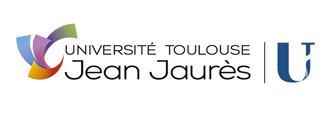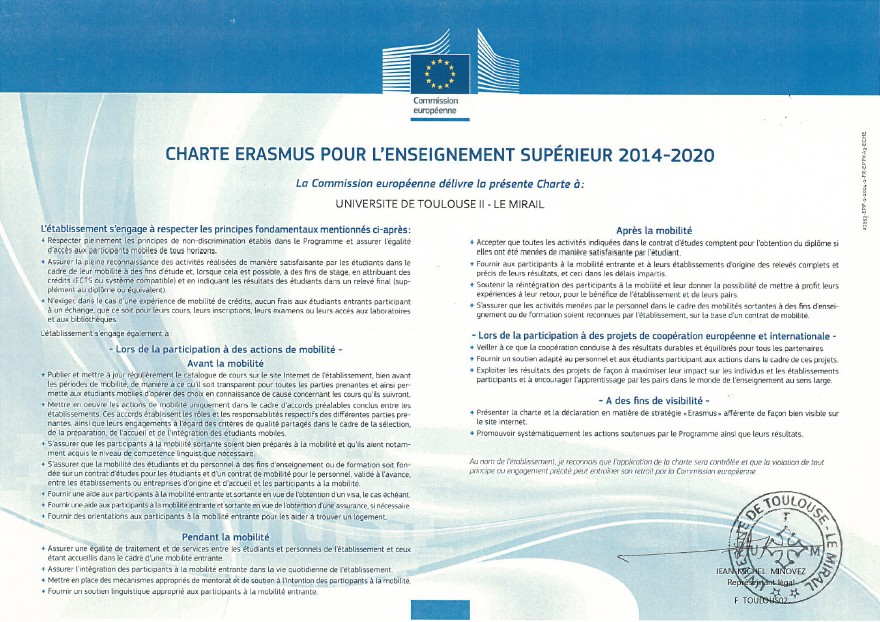-
Partager cette page
International policy
The academic world is currently facing many changes, new universities are emerging especially in Asia, and international rankings are being increasingly consulted. Neglecting these processes and changes would be unwise. In fact, the University of Toulouse-Jean Jaurès has many strong points from an international perspective, which the University should better communicate to international audiences through high-quality networks on a global level.
The university of tomorrow therefore must be international, not only to be well placed in the rankings, but also to encourage initiatives in research and in education, and above all to respond to students’ increasing and legitimate demands.
To achieve these goals in the coming years, significant resources need to be allocated and we need to build on the synergies with the COMUE (Federal University of Toulouse Midi-Pyrénées).
International Relations at the University of Toulouse-Jean Jaurès: A Clear and Proactive Strategy
Our strategy plans to intensify actions within various disciplinary and geographical frameworks to enhance our attractiveness and influence, in particular by taking advantage of our unique assets and the opportunities offered by the Federal University of Toulouse organization.
It is of paramount importance to enhance our position as a noted university in the southwest of Europe through joining high-ranking networks, a greater openness toward student and teacher exchanges, bi-lingual education, and by an effective marketing of our university in new geographical zones (in order of priority).
This intensification of International Relations at the University of Toulouse-Jean Jaurès is based on the following framework :
- University Departments :The faculties, departments, research institutes (ESAV, ESPE, IPEAT, etc.) and research groups mobilise their human and other resources to implement actions aiming at strengthening the international culture of the university.This culture is fostered by, for example, responding to international calls for projects, organising academic conferences (or other events with an international visibility such as fairs) and by promoting the integration of foreign researchers.In each department, an international relations correspondent provides support for students and guidance to staff and faculty in managing international programs (validating exchange programs, disseminating information, and improving the international vision of the various departments).
- Other Departments:Some are totally dedicated to international activities like the International Relations Department that develops the university’s international policy and ensures its continuity, it heads namely the “International and European projects unit” (this office, called POPEI, was created in 2015). Other departments work for the international relations too like the DIVE (International Student Service), the continuing education department, the CIAM, l’Institut des Amériques, etc…
Thus, our university will increasingly rely on the Europe+ department for European teaching and research projects, on the Toul'Box for the welcoming foreign students and researchers, and on the Federal University’s permanent overseas offices abroad (Brazil, China and Indonesia).
The Franco-Mexican House, which is linked to the Federal University, is an excellent example of the strong presence of the University of Toulouse-Jean Jaurès in Latin America. In addition, the Midi-Pyrénées regional government offers numerous scholarships for student international exchanges.
- The Student Union EIMA has more than 500 members and creates a strong link between multiple nationalities. In due course, it will provide a French student partner for each foreign student, whether in an Erasmus exchange or as part of a bilateral agreement.
Geographical priorities
- The Iberian Peninsula and Latin America, which has historically been a focus for our university. In these regions, we can build on the CADIST Ibérique, the IPEAT (Institut Pluridisciplinaire pour les Etudes sur les Amériques à Toulouse), the Madrid office, Mérimée-De Sebastian courses in Burgos, and synergies with the Federal University (the Franco-Mexican House and the permanent office in Recife).
At the same time, the University of Toulouse-Jean Jaurès intends to maintain its strong connections with Europe, the Mediterranean and certain countries in Sub-Saharan Africa, with whom we have long enjoyed close relations.
- The English-speaking world, as there is a strong demand from students and this would enable our university to join networks of excellence by offering bi-lingual education.
- Asia offers interesting perspectives, and here our university can rely on the branch in Kuala Lumpur and the permanent offices of the Federal University in China and Jakarta. We would also like to make up for a lack of Asian students in the past (particularly from India).
The University signed the Erasmus charter 2014-2020.

Tangible and effective actions in the short term
Drawing on the existing model of the Bachelor of History and the future Master's degree “History and Heritage of Aeronautics and Space.” These degrees respond to a strong demand from students, are challenging and interesting, and improve students’ future employment prospects.
- Increasing the number of dual-diplomas and improve the joint diploma policy. The many agreements UT2J has with excellent universities, such as those in Belgium, Switzerland and Scandinavia, are a springboard for this policy. UT2J has already links with these universities, which have a public service philosophy similar to ours. In addition, joint supervision of doctoral dissertations should be promoted and improved.
- Increasing support for outgoing exchange students, by increasing the Mirail Mundi scholarships recently created in order to have a greater number of students outbound compared to the number of students inbound under Erasmus or bilateral agreements. In only four years, we have doubled the number of outgoing students to 500. The goal is to again double that number to reach 1,000 outgoing students per year in the next five years.
- Strengthening the POPEI Office (European and International Program Support), also recently created, by recruiting an English native speaker at the executive level.
Improving the International Relations section of the University website, by developing a tri-lingual version with general information pages and news perfectly written in three languages (French, Spanish, and English). In addition, we should offer the option of high-quality automatic translation for more detailed pages. A trilingual on-line newsletter will be created in the three languages in cooperation with the student association EIMA to improve the integration of foreign students. A special telephone number will be available in June to respond to students' needs during the summer season with practical information and contacts with students and faculty.




